- Home
- Joel C. Rosenberg
The Jerusalem Assassin
The Jerusalem Assassin Read online
PRAISE FOR JOEL C. ROSENBERG
“Joel Rosenberg has an uncanny talent for focusing his storytelling on real-world hot spots just as they are heating up. He has done it again in The Kremlin Conspiracy.”
PORTER GOSS, former director of the Central Intelligence Agency
“Marcus Ryker rocks! Breakneck action, political brinksmanship, authentic scenarios, and sharply defined characters make Joel C. Rosenberg’s Kremlin Conspiracy a full-throttle and frightening ride through tomorrow’s headlines.”
BRIGADIER GENERAL (U.S. ARMY, RETIRED) A. J. TATA, national bestselling author of Direct Fire
“Joel C. Rosenberg writes taut, intelligent thrillers that are as timely as they are well-written. Pairing a fast-paced plot with an impressive understanding of the inner workings in the corridors of power of the Russian government, The Kremlin Conspiracy is a stellar novel of riveting action and political intrigue.”
MARK GREANEY, #1 New York Times bestselling author of Agent in Place
“The Kremlin Conspiracy is my first Joel C. Rosenberg novel, and I am absolutely blown away by how good this guy is. The story moves at a blistering pace, it’s crackling with tension, and you won’t put it down until you reach the end. Guaranteed. Simply masterful.”
SEAN PARNELL, New York Times bestselling author of Outlaw Platoon
“If there were a Forbes 400 list of great current novelists, Joel Rosenberg would be among the top ten. . . . One of the most entertaining and intriguing authors of international political thrillers in the country. . . . His novels are un-put-downable.”
STEVE FORBES, editor in chief, Forbes magazine
“One of my favorite things: An incredible thriller—it’s called The Third Target by Joel C. Rosenberg. . . . He’s amazing. . . . He writes the greatest thrillers set in the Middle East, with so much knowledge of that part of the world. . . . Fabulous! I’ve read every book he’s ever written!”
KATHIE LEE GIFFORD, NBC’s Today
“Fascinating and compelling . . . way too close to reality for a novel.”
MIKE HUCKABEE, former Arkansas governor
“[Joel Rosenberg] understands the grave dangers posed by Iran and Syria, and he’s been a bold and courageous voice for true peace and security in the Middle East.”
DANNY AYALON, former Israeli deputy foreign minister
“Joel has a particularly clear understanding of what is going on in today’s Iran and Syria and the grave threat these two countries pose to the rest of the world.”
REZA KAHLILI, former CIA operative in Iran and bestselling author of A Time to Betray: The Astonishing Double Life of a CIA Agent inside the Revolutionary Guards of Iran
“Joel Rosenberg is unsurpassed as the writer of fiction thrillers! Sometimes I have to remind myself to breathe as I read one of his novels because I find myself holding my breath in suspense as I turn the pages.”
ANNE GRAHAM LOTZ, author and speaker
“Joel paints an eerie, terrifying, page-turning picture of a worst-case scenario coming to pass. You have to read [Damascus Countdown], and then pray it never happens.”
RICK SANTORUM, former U.S. senator
Visit Tyndale online at www.tyndale.com.
Visit Joel C. Rosenberg’s website at www.joelrosenberg.com.
TYNDALE and Tyndale’s quill logo are registered trademarks of Tyndale House Publishers.
The Jerusalem Assassin
Copyright © 2020 by Joel C. Rosenberg. All rights reserved.
Cover photograph of dome copyright © Piero M. Bianchi/Getty Images. All rights reserved.
Cover photograph of explosion copyright © Alexyz3d/Shutterstock. All rights reserved.
Cover photograph of sniper copyright © Getmilitaryphotos/Shutterstock. All rights reserved.
Cover photograph of Jerusalem map copyright © 2019 Google. All rights reserved.
Designed by Dean H. Renninger
The Jerusalem Assassin is a work of fiction. Where real people, events, establishments, organizations, or locales appear, they are used fictitiously. All other elements of the novel are drawn from the author’s imagination.
For information about special discounts for bulk purchases, please contact Tyndale House Publishers at [email protected] or call 1-800-323-9400.
Library of Congress Cataloging-in-Publication Data
Names: Rosenberg, Joel C., author.
Title: The Jerusalem assassin / Joel C. Rosenberg.
Description: Carol Stream : Tyndale House Publishers, Inc., 2020.
Identifiers: LCCN 2019041032 (print) | LCCN 2019041033 (ebook) | ISBN 9781496437846 (hardcover) | ISBN 9781496437860 (kindle edition) | ISBN 9781496437877 (epub) | ISBN 9781496437884 (epub)
Subjects: LCSH: Political fiction. | GSAFD: Suspense fiction. | Christian fiction.
Classification: LCC PS3618.O832 J47 2020 (print) | LCC PS3618.O832 (ebook) | DDC 813/.6—dc23
LC record available at https://lccn.loc.gov/2019041032
LC ebook record available at https://lccn.loc.gov/2019041033
ISBN 978-1-4964-4605-3 (International Trade Paper Edition)
ISBN 978-1-4964-3787-7 (ePub); ISBN 978-1-4964-3786-0 (Kindle); ISBN 978-1-4964-3788-4 (Apple)
Build: 2020-02-20 11:44:44 EPUB 3.0
To my nephew, Luke,
for whom I have the deepest love and the fondest hopes.
CAST OF CHARACTERS
Americans
Marcus Ryker—special operative, Central Intelligence Agency
Richard Stephens—director of the Central Intelligence Agency
Martha Dell—deputy director of intelligence (DDI), Central Intelligence Agency
Peter Hwang—special operative, Central Intelligence Agency
Andrew Clarke—president of the United States
Barry Evans—U.S. national security advisor
William McDermott—deputy national security advisor
Margaret “Meg” Whitney—secretary of state
Kailea Curtis—agent with the Diplomatic Security Service
Geoff Stone—special agent in charge, Diplomatic Security Service
Carl Roseboro—deputy director, U.S. Secret Service
Robert Dayton—U.S. senator (D-Iowa), member of the Senate Intelligence Committee
Annie Stewart—senior foreign policy advisor to Senator Robert Dayton
Carter Emerson—pastor, Lincoln Park Baptist Church, Washington, D.C.
Maya Emerson—wife of the pastor
Russians
Oleg Stefanovich Kraskin—son-in-law to the late President Aleksandr Luganov
Mikhail Borisovich Petrovsky—president of the Russian Federation
Nikolay Vladimirovich Kropatkin—head of the FSB
Iranians
Grand Ayatollah Hossein Ansari—Supreme Leader of Iran
Yadollah Afshar—president of the Islamic Republic of Iran
Mahmoud Entezam—commander of the Iranian Revolutionary Guard Corps
Dr. Haydar Abbasi—Iranian ballistic missile scientist and director of Iran’s missile program
Israelis
Reuven Eitan—prime minister of Israel
Asher Gilad—director of Mossad
Tomer Ben Ami—deputy director of the Shin Bet
Palestinians
Ismail Ziad—president of the Palestinian Authority
Amin al-Azzam—Grand Mufti of Jerusalem
Hussam Mashrawi—director of the Waqf and son-in-law of the Grand Mufti
Saudis
Faisal Mohammed—monarch of the Kingdom of Saudi Arabia
Abdulaziz bin Faisal—heir to the throne and minister of defense
Abdullah bin Rashid—director of the General Intelligence Directorate
Turks
Ahmet Mustafa—president of the Republic of Turkey
Hamdi Yaşar—producer, Al-Sawt satellite television network
Others
Abu Nakba—commander of Kairos
Mohammed al-Qassab—member of Kairos
Maxim Sheripov—member of Kairos
Amina Sheripova—member of Kairos
Dr. Ali Haqqani—member of Kairos
“What enables the wise sovereign and the good general to overcome others and achieve things beyond the reach of ordinary men is foreknowledge. Now, this foreknowledge cannot be elicited from ghosts and spirits, nor by analogy with past events, nor by deductive calculation. It must be obtained from men who know the enemy situation.”
SUN TZU, THE ART OF WAR
Contents
Cast of Characters
Part 1 Chapter 1
Chapter 2
Chapter 3
Chapter 4
Chapter 5
Chapter 6
Chapter 7
Chapter 8
Chapter 9
Chapter 10
Chapter 11
Chapter 12
Chapter 13
Chapter 14
Chapter 15
Chapter 16
Chapter 17
Chapter 18
Chapter 19
Chapter 20
Chapter 21
Chapter 22
Chapter 23
Chapter 24
Part 2 Chapter 25
Chapter 26
Chapter 27
Chapter 28
Chapter 29
Chapter 30
Chapter 31
Chapter 32
Chapter 33
Chapter 34
Chapter 35
Chapter 36
Chapter 37
Chapter 38
Chapter 39
Chapter 40
Chapter 41
Chapter 42
Chapter 43
Chapter 44
Chapter 45
Chapter 46
Chapter 47
Chapter 48
Chapter 49
Chapter 50
Chapter 51
Part 3 Chapter 52
Chapter 53
Chapter 54
Chapter 55
Chapter 56
Chapter 57
Chapter 58
Chapter 59
Chapter 60
Chapter 61
Chapter 62
Chapter 63
Chapter 64
Chapter 65
Chapter 66
Chapter 67
Chapter 68
Chapter 69
Chapter 70
Chapter 71
Chapter 72
Chapter 73
Chapter 74
Chapter 75
Chapter 76
Chapter 77
Part 4 Chapter 78
Chapter 79
Chapter 80
Chapter 81
Chapter 82
Chapter 83
Chapter 84
Chapter 85
Chapter 86
Chapter 87
Chapter 88
Chapter 89
Chapter 90
Chapter 91
Chapter 92
Chapter 93
Chapter 94
Chapter 95
Chapter 96
Chapter 97
Chapter 98
Chapter 99
Chapter 100
Chapter 101
Chapter 102
Chapter 103
Chapter 104
Chapter 105
Chapter 106
Chapter 107
Chapter 108
Chapter 109
Chapter 110
Chapter 111
Chapter 112
Chapter 113
Chapter 114
Chapter 115
Chapter 116
Chapter 117
Chapter 118
Chapter 119
Chapter 120
Chapter 121
Epilogue
A Note from the Author
Acknowledgments
1
WASHINGTON, D.C.—15 NOVEMBER
They were coming, and he knew they were coming, and he knew why—they were coming to kill him and to kill the president and to kill anyone else who got in their way.
They were coming to settle scores.
The United States had inflicted too much damage in too short a time. Such actions could not simply be ignored. They had to be avenged. They had to be repaid at the highest levels, starting with the man responsible for issuing the strike orders.
What wasn’t clear was when or where the attacks would come or how many were coming or precisely how they would strike. Despite vacuuming up untold terabytes of phone calls, emails, text messages, and other electronic communications over the past month, America’s seventeen intelligence agencies had precious little to show for their efforts, and what few leads they had uncovered were infuriatingly inconclusive.
Yet why let threats of murder and chaos ruin a perfectly good evening? thought Marcus Ryker as he stepped out of the shower and toweled off. He had never been one to let himself become paralyzed by fear, and he certainly wasn’t going to start now. Growing up on Colorado’s Front Range, he had lived to push the boundaries, especially as a teenager, to experience the rush of the unknown, to suck the marrow out of life. He wasn’t repelled by danger; he was drawn to it, electrified by it. His sisters accused him of being an adrenaline junkie, and that was probably true. Still, he was no longer as reckless as he had been in his youth. That’s what he told himself, anyway. Time and experience and loss and immense pain had, he hoped, refined his most foolish instincts and perhaps tempered them with a bit of wisdom.
Unlocking the wall safe in his bedroom closet, he removed his Sig Sauer P229, inserted a full magazine, chambered a round, and put the automatic pistol in his shoulder holster. Next he withdrew two spare magazines and clipped those to his belt before closing and locking the safe. Though there was plenty of disturbing chatter out there, there was no credible intel indicating attacks were imminent anywhere in the homeland, much less here in Washington. But one could never be too careful.
Opening the front door of his apartment building, he scanned the street. Traffic seemed light, but it was still early. Other than a few teens huddled on a stoop across the street, he saw nothing suspicious. Satisfied that all was clear, Marcus walked briskly down the street and around the corner to where his 1986 Nissan Stanza was parked. It was ugly and brown and rusty and almost as old as he was, but somehow it still ran, and—best of all—it was paid for. He got in and started the engine.
Two blocks away, Marcus pulled over at a florist and spent far longer than he should have picking out an appropriate arrangement. Too many varieties. Too many colors. He couldn’t even remember the last time he’d bought flowers. He finally settled for a bouquet of daffodils and paid the clerk in cash.
They’d agreed to meet at seven. By the time he got to the town house, it was almost twenty minutes past. And there was no place to park. He eventually found a spot several streets away. He’d be even later now, but it gave him a chance to walk a bit, and that helped settle his nerves.
Finally reaching his destination, he stepped onto the front porch, knocked on the metal screen door, and waited under the porch light. The night was chilly, and there was a brisk breeze coming off the Potomac River. In faded blue jeans and boots, a black crewneck sweater over a white T-shirt, and a black leather jacket, he wasn’t exactly cold. But he suddenly wondered if he should have worn a suit or at least a shirt with a collar. In all that had happened over the past few years, there were some things he could not forget, no matter how hard he tried. There were others he struggled to remember, and social graces were among them.
Marcus knocked again, harder this time, but still no one answered. The longer he stood there on the cre
aky wooden porch, the more he wished he were home, ordering Chinese food, throwing on sweats, and falling asleep on the couch watching ESPN. Pete Hwang kept saying he needed to get out more. Then again, Pete was an idiot. A friend, of course. The best one Marcus still had. But an idiot nonetheless. Divorced. Estranged from his kids. Living alone in a new city. Yet insisting he was enjoying his newfound “bachelor’s life” and trying to get Marcus off his rear end and “back in the game.”
And then, just as he was contemplating walking back to his car, the front door finally opened.
2
“You made it,” Maya Emerson said in her distinctive Southern drawl.
“Sorry I’m late,” Marcus replied. “But I brought you these.” He held out the bouquet, and the old African American woman’s face lit up.
“Ooh, I love ’em—aren’t you sweet? And Marcy will be thrilled. She’s been talking about you all week, and she just loves daffodils. How did you know?”
As Marcus shrugged—he most certainly hadn’t known—the large woman stepped out on the porch and gave him a hug, kissed him on both cheeks, and insisted, as she always did, that he return the favor. Only then did she lead him inside. As Maya disappeared around a corner, Marcus took off his jacket and hung it in the front closet. At the same time, he removed the magazine from his pistol and cleared the chamber, slipping both the mag and the round into his jacket pocket.
The aromas wafting down the hall from the kitchen were heavenly, and they were beckoning him. Pot roast. Mashed potatoes and gravy. Sweet corn on the cob. Homemade chocolate chip cookies and a pot of freshly brewed coffee. From the family room, Marcus could hear the roaring fire and smell the crackling pine logs. And someone was playing the piano beautifully. That, he had no doubt, was Marcy.
Heading to the kitchen, he finally began to relax. He loved this home and he loved these people and he knew it was silly of him to have been anxious even for a moment. Somewhere in their midseventies now, Maya and Carter Emerson had been married for more than fifty years. Carter, a decorated Vietnam vet, had been pastoring Lincoln Park Baptist for at least forty. And since Marcus had started attending, they had effectively adopted him, constantly inviting him over for dinner on Wednesday nights before church and for lunch on Sundays after church. Given his schedule, he couldn’t always accept, and even when he was free, he didn’t always come. Mostly he didn’t want to be a bother. These two had so many others who needed their time and affection. Yet his periodic refusals never stopped them from inviting him, and he never regretted coming. The Emersons were the only family he had east of the Mississippi, and they had walked with him through the darkest days of his life.

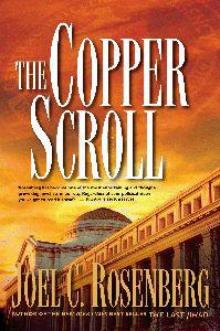 The Copper Scroll
The Copper Scroll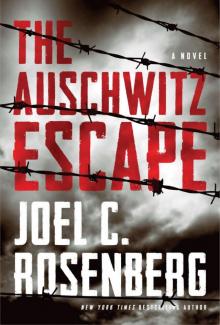 The Auschwitz Escape
The Auschwitz Escape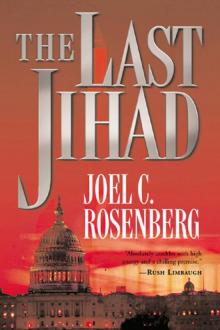 The Last Jihad
The Last Jihad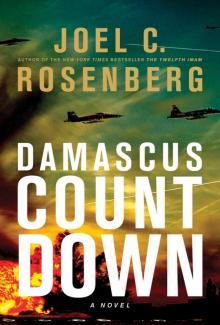 Damascus Countdown
Damascus Countdown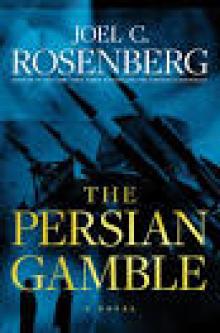 The Persian Gamble
The Persian Gamble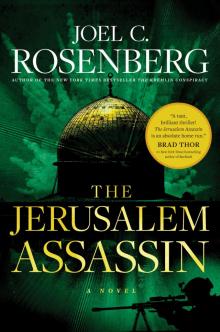 The Jerusalem Assassin
The Jerusalem Assassin Dead Heat
Dead Heat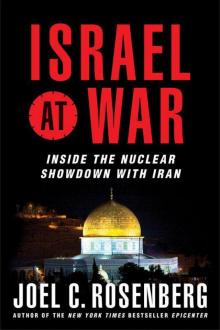 Israel at War: Inside the Nuclear Showdown With Iran
Israel at War: Inside the Nuclear Showdown With Iran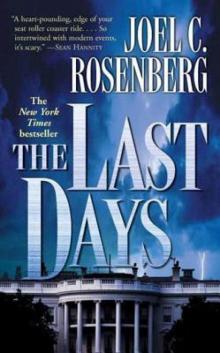 The Last Days
The Last Days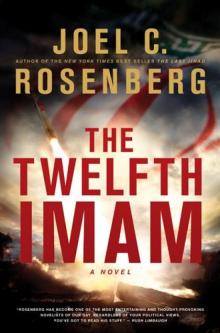 The Twelfth Imam
The Twelfth Imam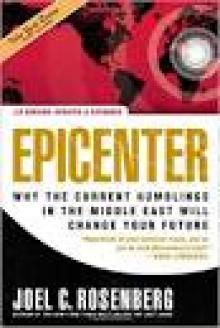 Epicenter 2.0
Epicenter 2.0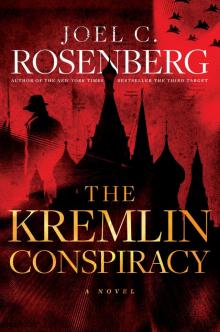 The Kremlin Conspiracy
The Kremlin Conspiracy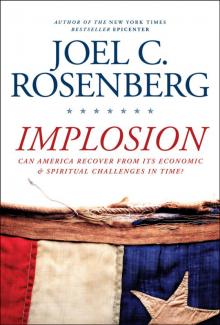 Implosion: Can America Recover From Its Economic and Spiritual Challenges in Time?
Implosion: Can America Recover From Its Economic and Spiritual Challenges in Time?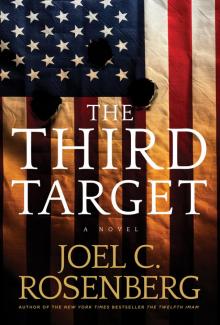 The Third Target: A J. B. Collins Novel
The Third Target: A J. B. Collins Novel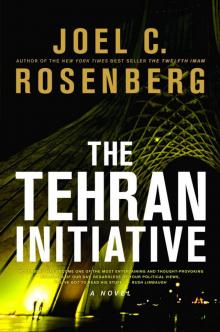 The Tehran Initiative
The Tehran Initiative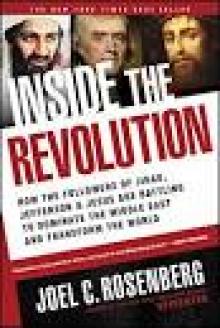 Inside the Revolution
Inside the Revolution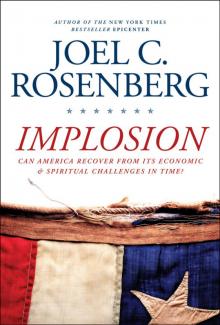 Implosion
Implosion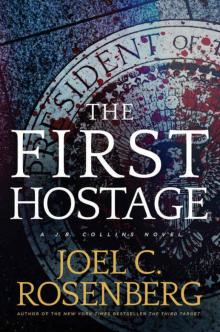 The First Hostage: A J. B. Collins Novel
The First Hostage: A J. B. Collins Novel